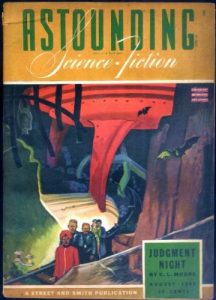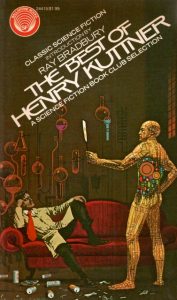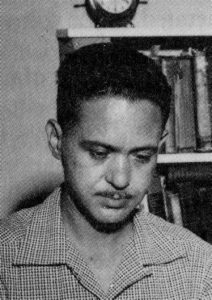Henry Kuttner (1915-1958) was born today, April 7. He, both alone and in collaboration with his wife C. L. Moore, was one of the most prolific authors of the 1940s. One of the things he excelled at was time travel. Over the next week or two I’m going to be looking at some of his time travel stories. The one today is available in an ebook, but some of the others won’t be as easy to obtain.
Before going further, I want to address one thing, and that’s who wrote what in Kuttner and Moore’s collaborations. By Moore’s own admission, they tended to work seamlessly together. She said that at times the only way they could tell who had written what was by a few variations in how they spelled certain words. So anything written with either by-line after their marriage in 1940 was to a lesser or greater degree a collaboration. Often their work was published under pseudonyms, the two most common being Lewis Padgett and Lawrence O’Donnell. I looked at one of their science-fantasy works over at Adventures Fantastic.
 “Endowment Policy” originally appeared in the August 1943 issue of Astounding, although the story states that it takes place in January of that year. It was published under the name “Lewis Padgett”.
“Endowment Policy” originally appeared in the August 1943 issue of Astounding, although the story states that it takes place in January of that year. It was published under the name “Lewis Padgett”.
As an aside, the cover story for that issue of Astounding was a serialization of the novel Judgment Night by C. L. Moore. When I asked on Twitter if anyone had any suggestions as to what story to look at, the only response I got was “C. L. Moore”. I’m going to read Judgment Night sometime in the next few weeks and review it either here or at Adventures Fantastic.
I first read “Endowment Policy” in the summer of…uh, the summer before I started high school, in The Best of Henry Kuttner. This morning was the first time I’ve read it since. And not because I didn’t like the story. I did. It’s just that the story never appeared in any of Kuttner’s collections up to that time, something I found odd, since it’s solid story.
Denny Holt is a New York City cab driver who checks in with dispatch and learns he’s been requested by name to pick up a fare. It’s a rainy night, and Holt isn’t too keen on going uptown. but he does anyway. The fare turns out to be an extremely old man who gives Denny a stack of bills totaling $1000 in cash if Denny will take him to a certain house in Brooklyn just before 11:00. (Denny comments on the bills being the new smaller size currency and thinks the old man must have been born around the time of the Civil War.) He wants Denny to steal a formula from a physicist’s safe and give it to the War Department.
 There are four men hunting the old man. It doesn’t take long to realize that something fishy is going on and that time travel is involved. The reader isn’t sure who the good guys are until the end of the story. Of course, this being a Kuttner story, the ending hints that things may eventually work out differently than anyone suspects.
There are four men hunting the old man. It doesn’t take long to realize that something fishy is going on and that time travel is involved. The reader isn’t sure who the good guys are until the end of the story. Of course, this being a Kuttner story, the ending hints that things may eventually work out differently than anyone suspects.
This is a well written story, with good dialogue and a strong sense of time and place. I don’t understand why it wasn’t reprinted in one of Kuttner’s collections during his lifetime other than the British (2 volumes) and Ballantine versions of The Best of Henry Kuttner, both of which were published long after his death. It is also a product of its time, with certain tropes we don’t see much anymore showing up, like the world dictator. I had an image of a robust man in jodhpurs watching a parade marching before him.
Anyway, this was an enjoyable story. It’s currently available in the omnibus collection The Best of C. L. Moore and Henry Kuttner.


I just yesterday listened to a reading of one of Kuttner’s Cthulhu Mythos stories “The Invaders.” It’s about an hour long.
https://www.youtube.com/watch?v=o978fUllfn8
I’ve always had the impression that Moore was the better writer than Kuttner, but when I think about it I can’t be sure who wrote what so…let’s just say they were both good writers.
They were both good writers, but the general consensus is that she was the better stylist while he had the more fertile imagination. When they collaborated, they were among the best.
Thanks for the link. It’s been a while since I’ve read any of Kuttner’s Mythos work.
Yeah, I believe that I heard that before.
Your welcome.
Pingback: Links: 2020-04-15 | Featured Futures
Moore says in the introduction to Fury that Kuttner did the Gallagher stories on his own.
My working theory is that if the text uses various colour adjectives, then it’s probably Moore writing (Kuttner seems to be a more monochromatic writer). My more simplistic take on your comment above.
Hi, Paul.
What edition of Fury are you looking at? I haven’t read the novel in years, although it’s on the agenda for later this year. I pulled my copy out and reread the Moore’s intro. I saw the part about color adjectives, but I didn’t see any mention of the Gallagher stories. I seem to recall seeing what you mention about Kuttner writing them on his own, but not in the copy of Fury I have. I’m looking at the Lancer edition, BTW.
Thanks.